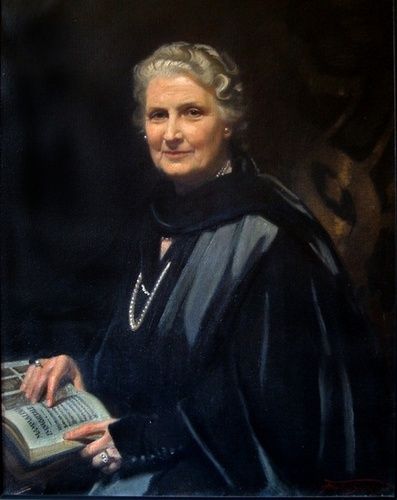
The Montessori pedagogy is an active pedagogy that meets the needs of the child to promote his harmonious construction and development.
It allows each child to develop at her/his own pace in her/his learning.
Developed by Maria Montessori, an Italian doctor, researcher and psychologist, this pedagogy must be understood as an aid to life and allow the full development of human potential. This is what the pedagogy is all about.
Montessori is not about letting children do what they want, and without limits. Montessori gives children the freedom to choose among the activities offered, those they want to do and that meet the development laws of each child.
According to Maria Montessori, the development of the child does not happen in a linear fashion but occurs in spurts. During the first 6-7 years of her/his life, the child acquires the main characteristics of humanity and the construction of his psychic structure. The self will be formed. The achievements will be consolidated thanks to the experiences of conquests he achieves in the community.
The Montessori pedagogy places the well-being of the child at the center, and provides them with suitable equipment to adequately meet their specific needs. Children need activities to build themselves up. We provide them with the necessary authentic material because it is through these activities that they can concentrate, improve their skills and manage to relate the elements (logical thinking).
We respect the rhythm of each child who is left free to choose the activities. The child chooses from the activities among those presented to her/him and which he wishes to do in order to build herself/himself according to her/his current needs and to meet the « demands » of the sensitive periods.
The tidy, beautiful, aesthetic and correctly stored material is arranged on the shelves from the simplest to the most complex.
The idea is that work begins at the shelf and ends at the shelf or where it started. A child cannot work with a material that is not stored on the shelf, on the tray or in the basket. Each child chooses to work where they want to for the time needed and wanted while respecting the material that is placed on a table or carpet and not on the floor. All this while taking care of the material

In Montessori, children learn to live with others. Because of the uniqueness of the material, children should wait when a material is being used before having it.
They respect the work of others, respect working children and develop the virtue of patience.
We make them aware of everything around us, animals, flora and how to take care of them.
Environments welcome the children in this important time of their life in a closed, protective place, which promotes concentration. Concentration establishes the foundation of a child’s character, and prepares her/his social behavior.
For concentration to take place, the child needs the free choice of his work, a work with a defined goal, a repetition of the work. Environments provide the child with work likely to promote the development of her/his concentration, she/he can thus build herself/himself.
« The result of concentration is the awakening of social sense »
Maria Montessori
A large class (30-35 children in the Children’s House and 15-17 in the Infant Community) allows to better reveal the differences in character and therefore to make social experiences more easily.
Children must therefore be numerous, unlike objects, in order to develop in a natural way thanks to the reality of the social life of the class, the important social qualities. The child experiences it this way every day and integrates it for life.
These are qualities that cannot be taught but which are lived through the experiences of a prepared environment and thanks to the freedom granted to children in this environment.


In Montessori, adults are guides for children. The role of the adult is to put the child in touch with the material that meets her/his need for internal construction and development. Through the presentations made, the child sees how to do it and can reproduce what he has seen before. Montessori materials contain control of error, so the child works independently, standing out from the eyes of the adult. Through observation, the adult adjusts the environment so that it meets the specific needs of each child and can provide useful help to the child.


The material is available to children in the environment, prepared by the educator and assistants. These ordered materials are often presented in trays or in baskets. Each material is always adapted to the size and strength of the children. Placed on the shelves from the simplest to the most complex, the child then has a vision of all the development aids present. The child has the possibility to live the experience as many times as he wants and by repetition, build herself/himself. The purpose of the material is internal.
« You can’t really get to know any living thing if you haven’t observed it in its natural environment. «
Maria Montessori
The environment should be scalable and adapt to children’s personalities. It must be up to their abilities. This is to allow their development, to allow adults to provide useful help, to allow life to develop and not hinder it, in application of the precept of Maria Montessori: education as an aid to life. Thus the environment prepared according to Maria Montessori is designed according to the specific needs of the child, which are different from those of adults.
In order to best prepare this environment, so essential element of the child’s life, it is necessary to rely on our knowledge of the child: the stages of development and those of sensitive periods characterized by the expression of trends human beings and the absorbing mind.